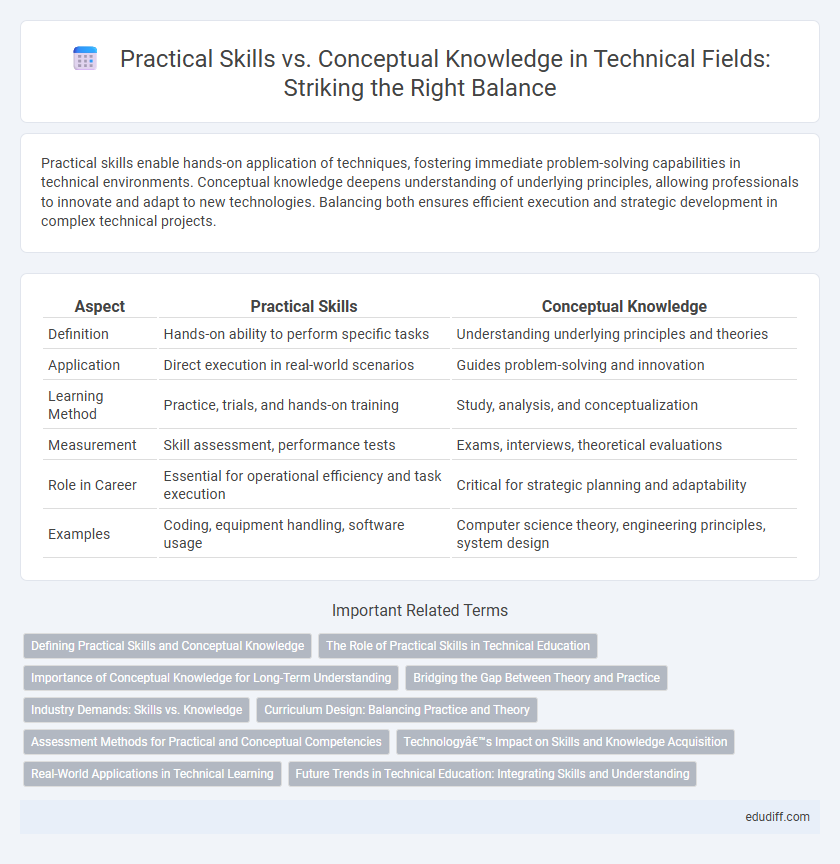Practical skills enable hands-on application of techniques, fostering immediate problem-solving capabilities in technical environments. Conceptual knowledge deepens understanding of underlying principles, allowing professionals to innovate and adapt to new technologies. Balancing both ensures efficient execution and strategic development in complex technical projects.
Table of Comparison
| Aspect | Practical Skills | Conceptual Knowledge |
|---|---|---|
| Definition | Hands-on ability to perform specific tasks | Understanding underlying principles and theories |
| Application | Direct execution in real-world scenarios | Guides problem-solving and innovation |
| Learning Method | Practice, trials, and hands-on training | Study, analysis, and conceptualization |
| Measurement | Skill assessment, performance tests | Exams, interviews, theoretical evaluations |
| Role in Career | Essential for operational efficiency and task execution | Critical for strategic planning and adaptability |
| Examples | Coding, equipment handling, software usage | Computer science theory, engineering principles, system design |
Defining Practical Skills and Conceptual Knowledge
Practical skills involve the ability to perform tasks and apply techniques in real-world scenarios, emphasizing hands-on experience and operational proficiency. Conceptual knowledge refers to understanding underlying principles, theories, and frameworks that explain how and why systems function. Mastery in a technical field requires integrating practical skills with conceptual knowledge to solve complex problems effectively.
The Role of Practical Skills in Technical Education
Practical skills in technical education enhance hands-on proficiency, enabling students to apply theoretical concepts directly to real-world tasks. Mastery of tools, machinery, and software through experiential learning bridges the gap between academic knowledge and industry requirements. This competence accelerates job readiness, boosts problem-solving capabilities, and fosters innovation within technical fields.
Importance of Conceptual Knowledge for Long-Term Understanding
Conceptual knowledge forms the foundation for deep understanding and the ability to transfer skills across varied technical domains, making it crucial for long-term expertise. Mastery of core principles enables problem-solving beyond rote procedures, ensuring adaptability in rapidly evolving fields like software development and engineering. Practical skills, while essential for immediate application, lack the flexibility and scalability that robust conceptual frameworks provide over time.
Bridging the Gap Between Theory and Practice
Bridging the gap between theoretical knowledge and practical skills requires integrating hands-on experience with conceptual understanding, enabling learners to apply abstract principles to real-world scenarios. Effective technical training programs emphasize project-based learning and simulations that reinforce theory through practice, enhancing problem-solving abilities and critical thinking. This alignment ensures that professionals can adapt theoretical models to dynamic environments, fostering innovation and operational efficiency.
Industry Demands: Skills vs. Knowledge
Industry demands increasingly prioritize practical skills over conceptual knowledge, emphasizing hands-on experience with current technologies and tools. Employers seek candidates proficient in real-world problem-solving, project execution, and adaptable technical competencies that align with fast-evolving market requirements. Balancing foundational conceptual understanding with applied skill sets enhances workforce readiness and innovation capacity in technical fields.
Curriculum Design: Balancing Practice and Theory
Curriculum design in technical education requires a strategic balance between practical skills and conceptual knowledge to ensure comprehensive learning outcomes. Emphasizing hands-on experience through lab work, simulations, and real-world projects fosters skill proficiency, while integrating theoretical frameworks and principles enhances critical thinking and problem-solving abilities. Effective programs leverage competency-based assessments and iterative feedback loops to harmonize practice with theory, preparing students for both immediate industry demands and long-term innovation challenges.
Assessment Methods for Practical and Conceptual Competencies
Assessment methods for practical skills often include hands-on tasks, simulations, and performance-based evaluations designed to measure the application of knowledge in real-world scenarios. Conceptual knowledge assessment typically involves written exams, quizzes, or oral questioning that test comprehension, critical thinking, and theoretical understanding. Combining both approaches through integrated assessments like project-based evaluations ensures a comprehensive measure of technical competence and conceptual grasp.
Technology’s Impact on Skills and Knowledge Acquisition
Technology accelerates skills acquisition by providing interactive simulations and real-time feedback, enabling practical learning in virtual environments. Conceptual knowledge deepens through access to vast online resources and adaptive learning platforms that tailor content to individual comprehension levels. This synergy between practical skills and conceptual understanding enhances workforce readiness and fosters continuous innovation in the technology sector.
Real-World Applications in Technical Learning
Practical skills in technical learning enhance the ability to apply theoretical concepts directly to real-world problems, improving efficiency and innovation in fields such as software development and engineering. Conceptual knowledge provides a foundational understanding crucial for adapting to new technologies and troubleshooting complex systems. Balancing hands-on practice with deep conceptual insight drives mastery and effective problem-solving in technical professions.
Future Trends in Technical Education: Integrating Skills and Understanding
Future trends in technical education emphasize the integration of practical skills and conceptual knowledge to equip learners for rapidly evolving industries. Advanced simulation technologies and AI-driven platforms enable immersive, hands-on learning experiences while reinforcing foundational theories. This holistic approach ensures adaptability and innovation, preparing students to meet complex technical challenges effectively.
Practical Skills vs Conceptual Knowledge Infographic

 edudiff.com
edudiff.com